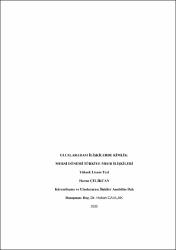| dc.contributor.author | Çelikcan, Harun | |
| dc.date.accessioned | 2021-07-06T07:51:48Z | |
| dc.date.available | 2021-07-06T07:51:48Z | |
| dc.date.issued | 2020 | |
| dc.identifier.uri | https://hdl.handle.net/20.500.11776/3915 | |
| dc.description.abstract | Türkiye ve Mısır ortak bir tarihsel geçmişe sahip olmalarına rağmen kuruldukları tarihten beri iyi ilişkiler kuramamış, iki devlet arasındaki ilişkiler genellikle rekabet ve krizlerin gölgesinde seyretmiştir. Uzun bir süre boyunca düşük bir düzeyde sürdürülen ve zaman zaman gerilimlere sahne olan ilişkiler, Arap baharı sürecinde Mısır’da yaşanan iktidar değişikliği ile farklı bir boyuta geçmiştir. Bu süreçte Müslüman Kardeşlerin Mısır’da iktidara gelmesi ile Türkiye-Mısır ilişkileri hızlı bir şekilde değişmiş, krizleri ve gerilimleri aşarak müttefik ilişkisine dönüşmüştür. Bu süreçte iki devlet arasında birçok alanda iş birliği ve ortaklıklar kurulmuş ve ikili ilişkilerin altın çağı olarak kabul edilebilecek bir döneme girilmiştir. İki devlet ilişkisinin kısa sürede hızlı bir değişim yaşaması bu araştırmanın yapılmasına kaynaklık etmiştir. Bu tezde Türkiye-Mısır ilişkilerinin değişen doğası sosyal inşacı yaklaşım çerçevesinde incelenmiştir. İki devletin birbirlerine yönelik algılarını ve politikalarını anlamak için iki tarafın kimliklerini ve kimliklerinin oluşum sürecini anlamak gerekmektedir. Türkiye ve Mısır tarihsel anlamda kimliklerini farklı şekilde tanımlamışlardır bu tanımlama ise birbirlerinden farklı çıkarlar belirlemeleri sonucunu doğurmuştur. Farklı kimlik ve çıkarlara sahip olmaları ise birçok alanda uyumlu eylem veya davranışlarda bulunmalarını zorlaştırmıştır. Sahip oldukları sosyal ortaklıklar sonucunda bir dönem birbirlerini algılamalarına “biz” bakış açısı hakimken ayrı devletler olarak kurulduktan sonra her iki devlet de birbirlerine göre “öteki” yi temsil etmeye başlamıştır. Bunun sonucunda ve bölgesel dinamiklerin de etkisiyle ikili arasındaki sistemik etkileşim karşıtlıklar üzerinden sürdürülmüştür. Mısır’da Müslüman Kardeşlerin iktidara gelmesi ile Adalet ve Kalkınma Partisinin iktidarda bulunduğu Türkiye ile ilişkiler önemli ölçüde gelişme göstermiştir. Bu dönemde birbirleri ile uyumlu hale gelen kimlik yapıları ile beraber ortaya çıkan ortak kadere yönelik inanç ve bölgesel gelişmelerden kaynaklanan ortak kaygılar ilişkilerin doğasını değiştirmiştir. Bu anlatılanlar ışığında, bu tezde Mısır’da Müslüman Kardeşlerin iktidarı döneminde Türkiye ile Mısır arasında değişen ikili ilişkiler her iki devletin kimliklerine odaklanılarak sosyal inşacı yaklaşım çerçevesinden incelenmiştir. | en_US |
| dc.description.abstract | Despite being Turkey and Egypt have a common historical background since the date of their establishment failed to establish good relations, relations between the two states often remained in the shadow of competition and crisis. Relations which have been maintained at a low level for a long time and that have experienced tensions from time to time, have changed to a different dimension with the change in power in Egypt during the Arab Spring. In this process, Turkey-Egypt relations with Muslim brothers coming to power in Egypt, changed quickly, wercoming crisis and tensions turned into an allied relationship. In this process, cooperation and partnerships have been established in many areas between the two states and a period that can be accepted as the golden age of bilateral relations has been entered. The rapid change of the two state relations in a short time was the source of this research. The changing nature of Turkey-Egypt relations were studied in this thesis within the framework of social constructivist approach. In order to understand the perceptions and policies of the two states towards each other, it is necessary to understand the identity and the formation process of the two parties. Turkey and Egypt have defined the historical sense of identity in a different way if this has led to the identification results to determine the different interests of each other. Having different identities and interests, on the other hand, made it difficult for them to perform harmonious actions or behaviors in many areas. As a result of their social partnerships, both states started to represent the “other” relative to each other after they were established as separate states while the “we” perspective perceived each other. As a result, and with the influence of regional dynamics, systemic interaction between the two has been maintained through oppositions. Egypt with the Muslim Brotherhood coming to power of the ruling Justice and Development Party where relations with Turkey have improved considerably. In this period, the beliefs towards the common destiny that emerged with the identity structures that became compatible with each other and common concerns arising from regional developments changed the nature of the relationsIn the light of these narratives, During the rule of the Muslim Brotherhood in Egypt bilateral relations between Turkey and Egypt this thesis focusing on the changing identity of both states have been analyzed in the framework of a social constructionist approach | en_US |
| dc.language.iso | tur | en_US |
| dc.publisher | Namık Kemal Üniversitesi | en_US |
| dc.rights | info:eu-repo/semantics/openAccess | en_US |
| dc.subject | Türkiye-Mısır İlişkileri | en_US |
| dc.subject | Sosyal İnşacı yaklaşım | en_US |
| dc.subject | Kimlik ve çıkar | en_US |
| dc.subject | Müslüman Kardeşler | en_US |
| dc.subject | Millî Görüş Hareketi | en_US |
| dc.title | Uluslararası ilişkilerde kimlik: Mursi dönemi Türkiye- Mısır ilişkileri | en_US |
| dc.title.alternative | Identity in International Relations: Mursi Period Turkey-Egypt Relations | en_US |
| dc.type | masterThesis | en_US |
| dc.department | Enstitüler, Sosyal Bilimler Enstitüsü, Küreselleşme ve Uluslararası İlişkiler Ana Bilim Dalı | en_US |
| dc.relation.publicationcategory | Tez | en_US |



















